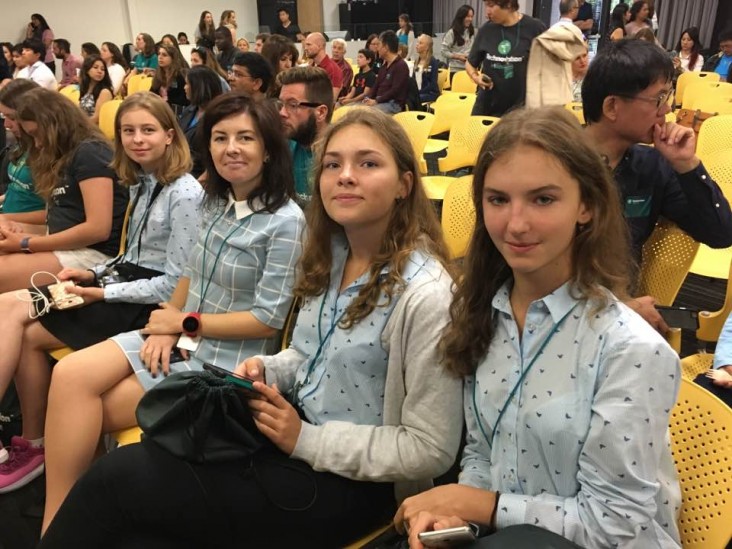Speeches Shim

October 2017—Three girls from the Ukrainian city of Zaporizhzhia wanted to learn computer coding. They also knew that air pollution was the biggest problem their city faced and were determined to find a way to address the issue. At their teachers’ urgings, they took on the Technovation Challenge, an international competition that encourages girls to learn computer coding and use the knowledge to address specific issues in their communities that have global impact.
Dasha Tabunschyk, Zhenya Kaminska and Anya Shilo, who call themselves “Z-Teen” and are all about 14 years old, decided that helping residents find relief from their city’s air pollution was their aim. They quickly discovered the MIT App Inventor 2 mapping software, developed by the Massachusetts Institute of Technology, and began to map out data points on pollution levels in Zaporizhzhia.
“We used MIT App Inventor 2 software to develop maps showing the points where officials measure the quality of the air on a daily basis,” explained Dasha. “The data are transferred to the mobile application, where all Zaporizhzhia residents can see for themselves what areas that they need to avoid because they are most heavily polluted that day.”
The mobile app they developed, which they call Air Near, allows smartphone users to see the levels of air pollution in specific rayons, or areas, of Zaporizhzhia and whether they fall within the limits proscribed by government regulations. Z-Teen’s objective was not merely to make residents more aware of the problem, but to motivate them to become agents of change, actively standing together to demand compliance with international, not old Soviet, standards.
Zaporizhzhia has been an important industrial and manufacturing center since Soviet times—producing much of Ukraine’s steel aluminum, chemicals, and automobiles—leaving it with the worst air quality in the country.
“What we see in our city every day is excessive amounts of various harmful substances in the air, making people more concerned about their allergies or asthma when they go outside, rather than enjoying themselves,” explained Dasha in a Facebook post.
Air Near worked so well that, a few months after its development, the girls were invited to the first Technovation Challenge-Ukraine Pitch Event finals, held in April at Kyiv’s Polytechnic University, where the team competed with 15 other all-girl teams from schools across Ukraine. Their innovative idea and their pitch performance earned them the grand prize.
Several months after the Ukraine competition, the team was invited to join the global Technovation Challenge finals in San Francisco as representatives from Ukraine, courtesy of USAID and the Western NIS Enterprise Fund. The three girls of Z-Teen would never have dreamed before April that, by August, they would be in San Francisco—one of six visiting national teams joining 12 finalist teams from across the globe for an exciting week in the city largely considered the IT capital of the world.
At the global level, a team from Kazakhstan, which triumphed in the senior tournament for girls up to 17 years old, developed a mobile app to track the location of friends and relatives, which is particularly important in countries with a high risk of kidnapping. The app lets parents know if their children are at school or if they are lost; by pressing a single button, children can send a message to their parents. The girls went a step further and developed an external button that the children can carry in their pockets, enabling them to stay in touch even if their phone is in their purse or backpack.
A team from Hong Kong, which won the grand prize in the junior tournament for girls up to 13 years old, developed a piece of software that helps senior citizens, particularly those with memory loss, to stay in touch with their loved ones by playing a game, which also indicates if the disease is progressing or in remission. Because the seniors may often prefer not to have conversation or physical contact with other people, the game helps to address a medical problem.
Today, Technovation Challenge is active in over 100 countries, with support from the United Nations, Adobe, Google and Dropbox. Girls aged 10 to 18 are given an opportunity to learn computer coding, develop their own projects and mobile applications, and develop business plans to support their ideas, while also learning how to pitch them before large audiences. Their mission is to find technology-based solutions to the problems that exist in their societies.
Technovation Challenge participants often work on issues linked to the United Nations Millennium Development Goals, including poverty reduction, access to education and health care, and environmental protection. In Ukraine, Technovation Challenge is implemented with support from USAID and the Western NIS Enterprise Fund.
LINKS
Follow @USAIDUkraine, on Facebook

Comment
Make a general inquiry or suggest an improvement.